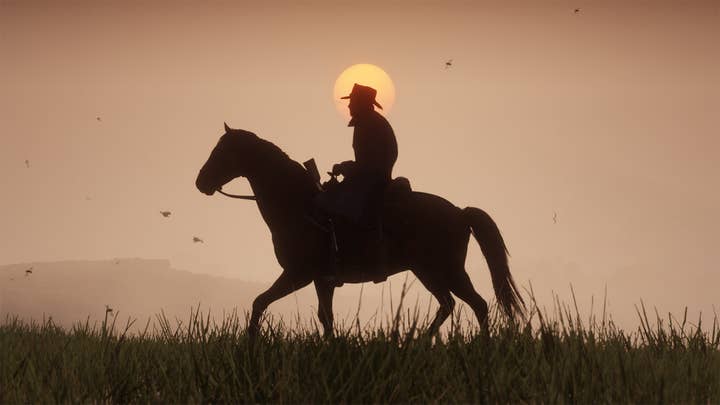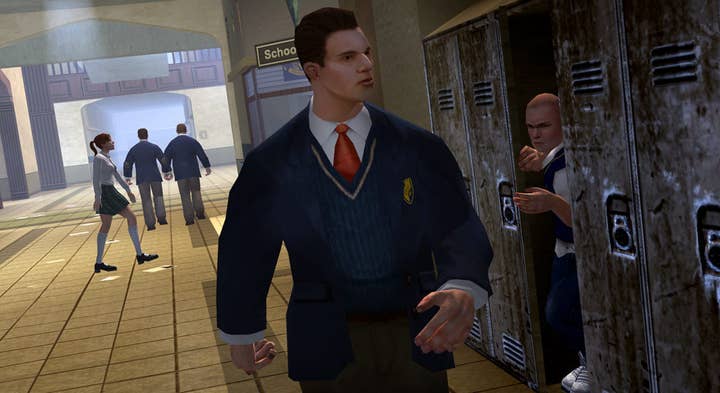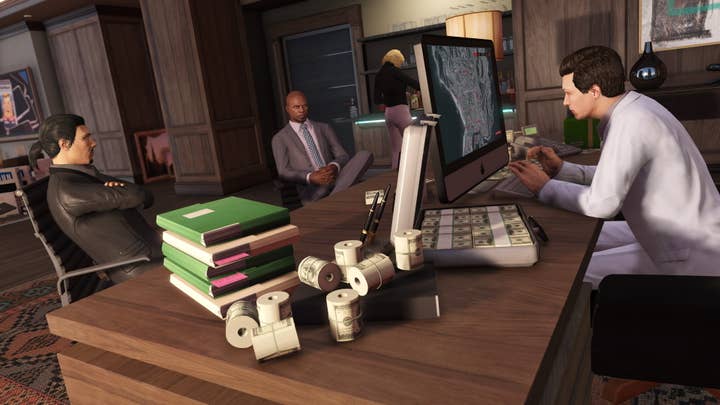Rockstar's broken work ethics
Former employees detail mandatory long hours, unpaid overtime, and a culture of fear at studios behind Grand Theft Auto and Red Dead Redemption
"I was burned out, plain and simple. Even if the longest period of extended hours was only a few months for me, it ruins your life. You want to get these games out in as good a state as possible and you want to work with your friends but eventually almost everyone burns out. Dozens of people would be signed off with depression. I know lots of people whose relationships suffered. People went days without seeing their children."
"It's a sweatshop, make no mistake, and you are just a number. Expendable, replaceable. And certainly not a dignified human being worthy of respect."
"I lost all passion for video games, and I don't even play them in my spare time anymore. I can't even get excited about games that I used to love. I decided that the long hours, low pay, bullying, and the general toxicity of the environment that I experienced in was not worth the hassle of staying in the industry."
These are quotes from three different former Rockstar Games developers we spoke with in recent weeks about working conditions at the company behind Grand Theft Auto and Red Dead Redemption. They and several others (fewer than a dozen, all no longer with the company) talked to us with the understanding they would not be identified in the story for fear of reprisals. Much of what they told us fell in line with what was reported in Kotaku's feature on Rockstar working conditions from earlier this week, but their additional details and perspectives serve to further fill in an image of the studio's culture.

We approached some of the sources. Others sought us out, saying they felt a need to set the record straight after Rockstar co-founder Dan Houser's insistence that any overtime at the company was never mandatory in defending the 100-hour work weeks he and other senior writers had pulled on Red Dead Redemption 2 this year.
"I was really annoyed to see Dan framing the crazy overtime as simply a passion thing," one source said. "That's rubbish, it's a mandatory part of the culture for everyone from the top down."
"Sometimes I had to stay at work just to make higher ups happy, even if I didn't have work to do. Sometimes I had to come in on holiday breaks, even if there wasn't work to do, or anyone to review it"
A former Rockstar NYC developer
Another from a different Rockstar studio talked about working crunch shifts from 10:30 a.m. to 2 or 3 a.m., saying, "It was incredibly insulting for Dan to claim nobody else has to do those types of hours when most of us did, and for a lot longer than three weeks."
An ex-employee at Rockstar Toronto said the studio had teams working minimum 60-hour work weeks, something that employee wasn't informed about until their first day on the job. One former developer at Rockstar New England recalled meetings where management said employees were expected to work a certain amount of overtime hours each week, including Saturdays. One ex-Rockstar developer from the Lincoln QA studio described working for two or three months of 12 hour days, six days a week. There were also lighter crunch periods where they would work "only" 10 hours days with occasional weekend shifts.
One former Rockstar NYC developer talked about crunch on Max Payne 3 getting so bad some employees were working overnight shifts. Another from the same studio characterized overtime as "100% mandatory," saying in the last console generation seven-day work weeks were the norm.
"There wasn't so much a schedule, just the whim of higher ups which kept us late," they said. "At many points it was understood that we had to keep working until a department head told us to pack up... Sometimes I had to stay at work just to make higher ups happy, even if I didn't have work to do. Sometimes I had to come in on holiday breaks, even if there wasn't work to do, or anyone to review it."
The idea that overtime was simultaneously mandatory but also left unsaid was common among many of the developers we spoke with.
"There was a lot of managerial pressure to work these long hours," one of the former Rockstar NYC developers said. "Even if they didn't flat out say the words 'required' and 'mandatory', they would say things like 'we need to start working more hours' and 'we're going to have to start ramping things up' ... They loved to be ambiguous and not actually give a set number of hours to start, as well; just leaving it up to people to do themselves."
Developers at two studios described weekly hours reports that management would use to either shame those not putting in as many hours or hold up those putting in the most hours as examples to follow. We were also told about management fostering competition between studios and teams by showing them "leaderboards" of how many more hours other groups were putting them in and challenging them to top those numbers.
"There were always meetings where it was drummed into you that if we didn't get this game out on time, we'd risk losing our jobs and letting everyone down," a former Rockstar Lincoln developer said. "It was heavily implied that you had to do the overtime otherwise you'd have to find another job. During my time there, no one refused the extended hours, I think through fear of being fired."
In fact, two different developers from two other Rockstar studios told the same story of a Rockstar New England developer who tried to avoid overtime during Grand Theft Auto V's crunch and was fired over it. Though it may be apocryphal, having such a tale transmitted through the studio system speaks to factors that reinforce the company culture.
"There was always this idea that if you didn't put in the hours, you'd be fired or laid off after release, your year-end raise or bonus would be affected, and even your career progression would take a hit," a former Rockstar NYC employee said. "The way crunch was pushed made it sound like putting in the hours showed how dedicated you were to the company. You wanted to be seen by Sam or Dan [Houser] working at your desk until late at night, and they wanted to see people in their seats working until late at night. They would walk the floors just to see who was at their desks."
Not every studio could have the regular threat of a Houser walkthrough to keep developers working, but the company had other ways to encourage longer hours. A former Rockstar Toronto developer told us the studio provided meals for employees during crunch, but with a catch that you had to have logged 10 hours that day in order to have any.
"There were long lines for the food, so I'm sure we all did lots of work," they said.

The pressure to put in long hours came not just from their bosses, but also from their peers.
"Anyone who stayed later than everyone else would inadvertently set a precedent, and everyone else would be expected to follow suit. You didn't want to be the one person packing up to leave while the entire rest of your team was hanging around," a former Rockstar NYC developer said. "There wasn't any outright hostility towards anyone, but you'd get glaring and people would complain to one another about you after you left. When you have to work with this team for 12 hours plus every day for months at a time, you also just plain didn't want to piss anyone off, either."
The same person said it was not uncommon for anyone complaining about the hours to have a more senior colleague respond with, "Be thankful you even have a job."
"It felt like they just wanted us constantly afraid to keep us in line"
A former Rockstar San Diego developer
That peer pressure also contributed to what multiple ex-Rockstar employees described as a culture of fear.
"They always loved to say 'You don't want to be 'that guy,'" said an ex-Rockstar San Diego developer, "with 'that guy' being the one that leaks something or is caught talking about the company."
Employees were regularly reminded in meetings and emails that they were forbidden to discuss non-work matters while at the studio, and would be regularly reminded of the studio's strict social media policy (which Rockstar recently lifted to allow current employees to defend its work practices in public). The developer said employees were always watched at work, with cameras throughout the studio and instant messages and PCs actively monitored.
That sense of being under constant surveillance was heightened by a number of "Merryweather Security" signs posted throughout the office. Merryweather is a fictional paramilitary and private security group in Grand Theft Auto V and one of the game's antagonist factions. Each of the signs had a slogan, some of them reinforcing certain elements of the company culture. For example, one in the kitchen said "No Social Media - Violators will be shunned."
"I don't know if they were meant to be a joke, but they were definitely not funny to some of us," they said. "It felt like they just wanted us constantly afraid to keep us in line."
While some of the incentives to work long hours were no doubt of the "stick" variety, there was also at least one in the "carrot" category: bonuses. A number of the people we spoke with recalled the promise of periodic large cash injections for all their hard work.
One former Rockstar developer admitted "we'd do OK out of bonuses," while another spoke of a yacht that a lead from one of the company's hit games was able to buy thanks to a bonus. (Again, possibly an apocryphal story, but one that serves Rockstar's interests to have floating through the company.)

While there never appeared to be a precise or transparent formula for any developer to figure out what kind of bonus they could expect, multiple people we spoke to saw them as tied to how much overtime was put in. In the cases of Rockstar Toronto, Rockstar Lincoln, and Rockstar NYC, where we were told some salaried developers did not receive additional pay for overtime, bonuses were particularly important for justifying the long hours.
However, a former Rockstar Toronto developer called it a rhetorical slight of hand, saying they did the math on one of their bonuses and found that it fell far short of what they would have made for their overtime at a standard time-and-a-half rate.
"It was often mentioned that we'd 'never crunch that hard again' so more people would be hired. If anything, it got worse every time"
A former Rockstar Lincoln developer
After a particularly grueling period of crunch, a large bonus and shipping a hit game could no doubt entice some developers to stick with the company for a while longer. So could a pledge to the employees that the studio knew there was a problem with its working culture and was trying to fix it.
"After every big game there was a period of reflection where there'd be attempts to plan for the future, it was often mentioned that we'd 'never crunch that hard again' so more people would be hired," a former Rockstar Lincoln developer said. "If anything, it got worse every time."
If management pays lip service to the idea of less crunch, that at least indicates some awareness that there is a problem. Unfortunately, not all of the people we spoke to even saw that much from the company higher-ups.
"I got the impression that many in the upper management actually enjoyed it," another former developer said. "Crunch indicated teamwork, dedication to the project, love for and loyalty to the company, and hard work; people sacrificing their lives for the company/the game... They want to believe that these people truly want to be there and that's why they stay; rather than acknowledging the reality of the situation."
And even among former employees willing to talk to us for an article like this, there was an understanding that many Rockstar employees absolutely do want to be there. One developer noted that beyond the possibility of lucrative bonuses, Rockstar doesn't engage in the sort of mass layoffs and office closures that seem common elsewhere in AAA (Rockstar Vienna was not mentioned), and can give employees significant time off between projects to recharge their batteries. Perhaps just as important, Rockstar developers tend to make games that meet with critical and commercial success.
"You're making stuff with genuine cultural heft, which is internally emphasized to staff," one former developer said. "So Dan's [statement] about 'We do it for the love' makes you feel 'Yeah, that's me.'"
They added that loyalty is a point of emphasis for Rockstar management, saying other ex-Rockstars they've spoken to have described the studio culture as tinted by Stockholm syndrome, in which a person held hostage begins to side with their captors after a time.
Some of the developers we spoke with expressed relief at current Rockstar developers speaking out to say the company culture has improved and working hours are manageable. Others were skeptical of the improvement, and the added bit of transparency was salt in the wounds for some of the former staff.
"Finding out now that they've been paying other studios' employees overtime pay for 50 hours of work when the Toronto office put in 60 [without overtime pay] for years at a time was infuriating"
A former Rockstar Toronto developer
"The biggest issue I have with all this is that senior management and developers from other studios seem to be denying that overtime is compulsory or even happens at all," an ex-Rockstar Lincoln employee said. "In QA it's a huge part of the job. We were always under the illusion that all studios crunched as we did but now that seems to not be the case."
Hearing other developers tout their fair treatment using overtime compensation as an example also rubbed at least one other former employee the wrong way.
"Finding out now that they've been paying other studios' employees overtime pay for 50 hours of work when the Toronto office put in 60 for years at a time was infuriating," they said.
Another was irked that Rockstar's current employees would try to diminish their former co-workers' stories.
"It's really bothersome to see people feeding into the narrative that we're all just bitter ex-employees when our experiences are just as legitimate as their positive ones," another said. "It's hard to see stories like mine being so quickly dismissed. It makes no sense to be bitter because the people that would ultimately be hurt by it are my friends that are still there. I want better for them and I hope this helps get the conversation going in the right direction so nobody else has to deal with what I did."
For some of the people we spoke with, the experience with Rockstar was enough to drive them out of games. Others went on to find work at other developers. Some have found their experiences at other AAA studios very much in keeping with the Rockstar experience when it comes to employee treatment; others have found successive employers much improved. Several are still a bit conflicted about it all.
"The vast majority of the people that I worked with are truly some of the most kind-hearted, intelligent, funny, inspiring, ambitious, and hard working people I have ever had the pleasure to know, and I did have some good times at Rockstar," one said. "Unfortunately in my case, the bad things that I experienced took too much of a toll on my physical and mental health that I decided it's just not worth it."
Another echoed that sentiment, saying, "I feel as though my skills and passion are suited for the industry but it's taken me a long time to get over the damage that crunch did. It really knocked my confidence and I've found it hard to impose myself in situations ever since. That being said, Rockstar wasn't all bad. I miss the team spirit we had there, through the hard times and the forgettable times.
"I'd like to add that I don't blame my managers. I blame who they answer to... I know my managers were just doing what was asked of them and in some cases looking after us as best they could."
GamesIndustry.biz has contacted Rockstar Games for their response, but has yet to receive a reply. We will update the article if we do.








